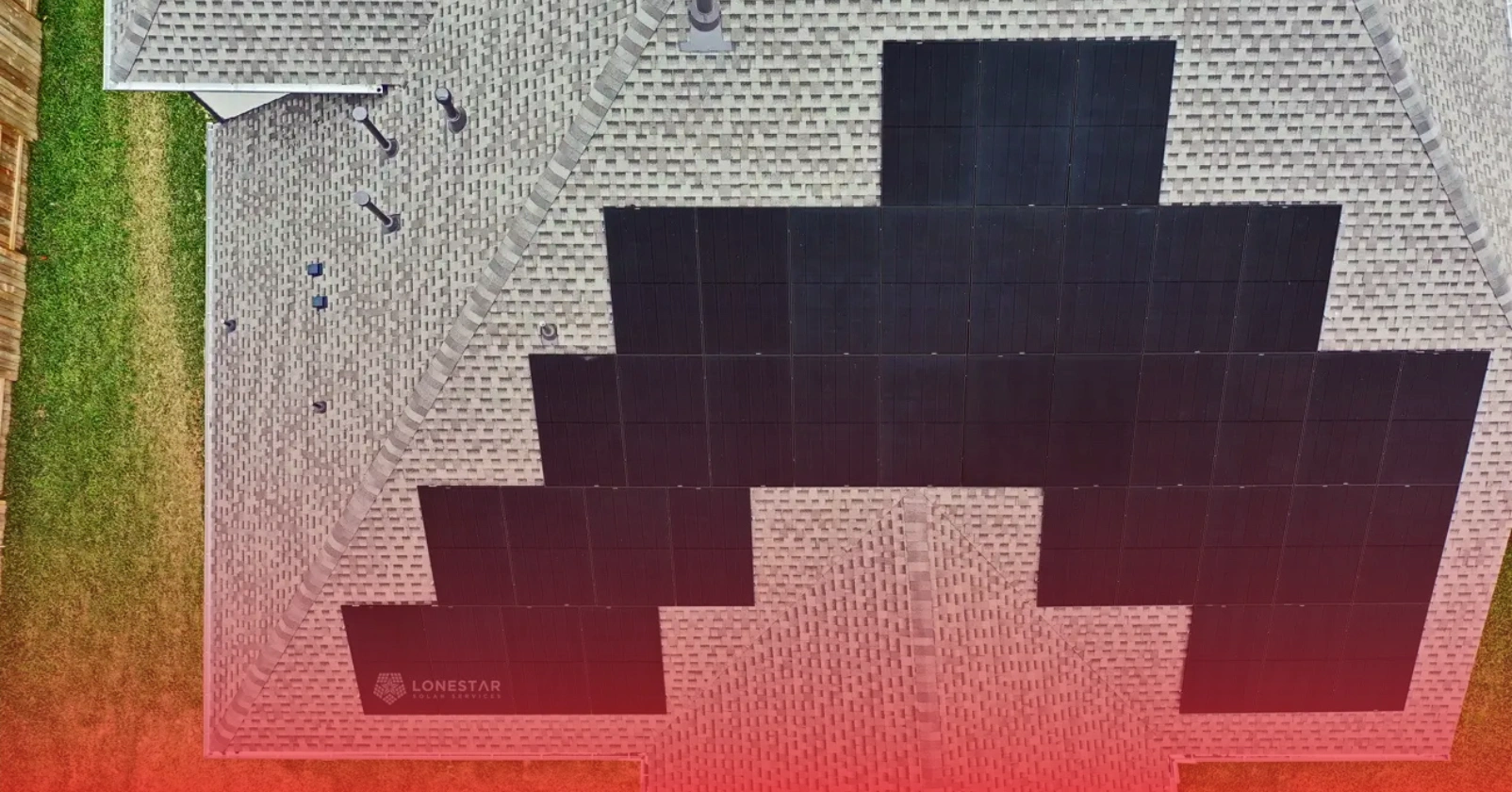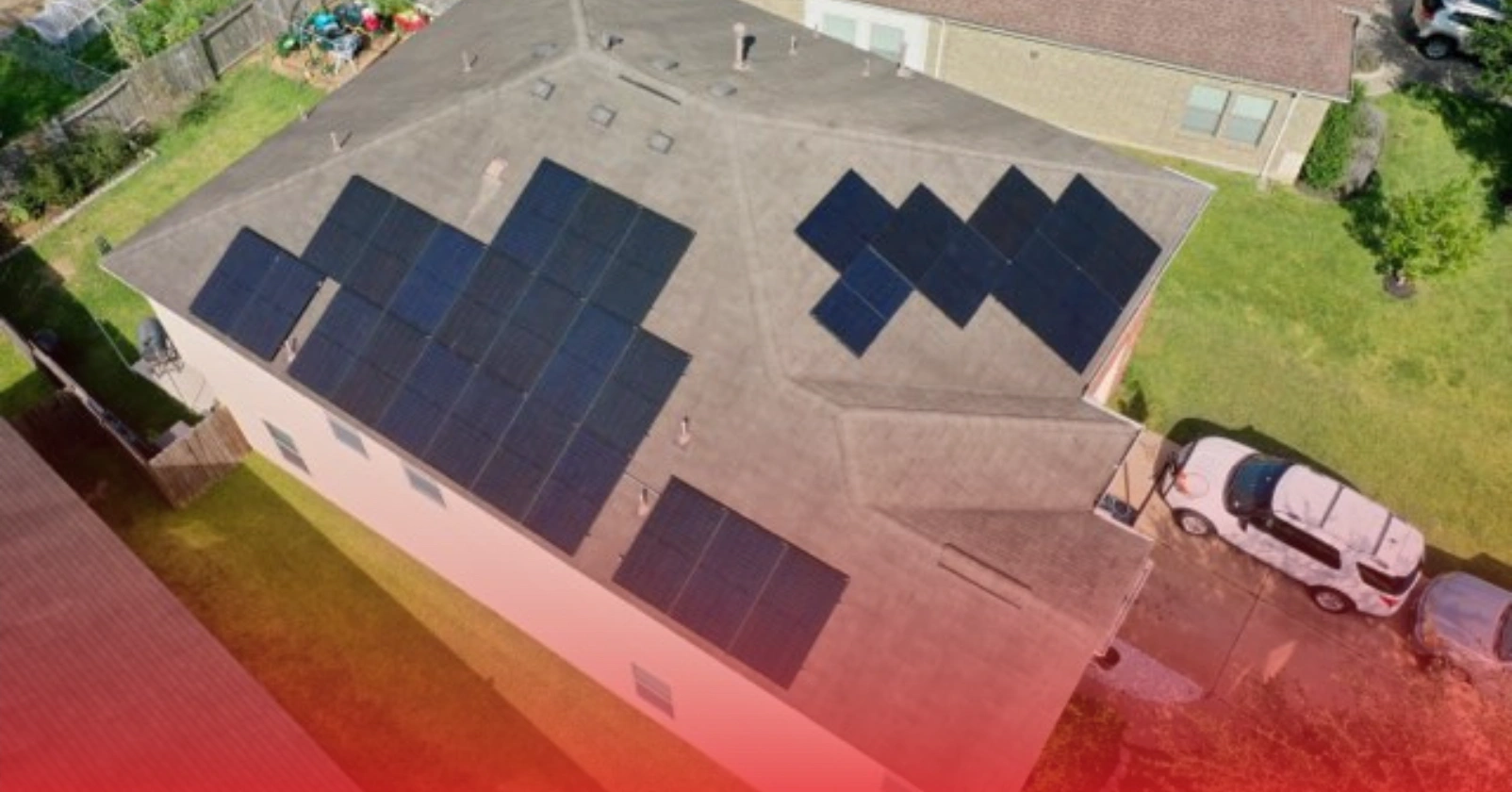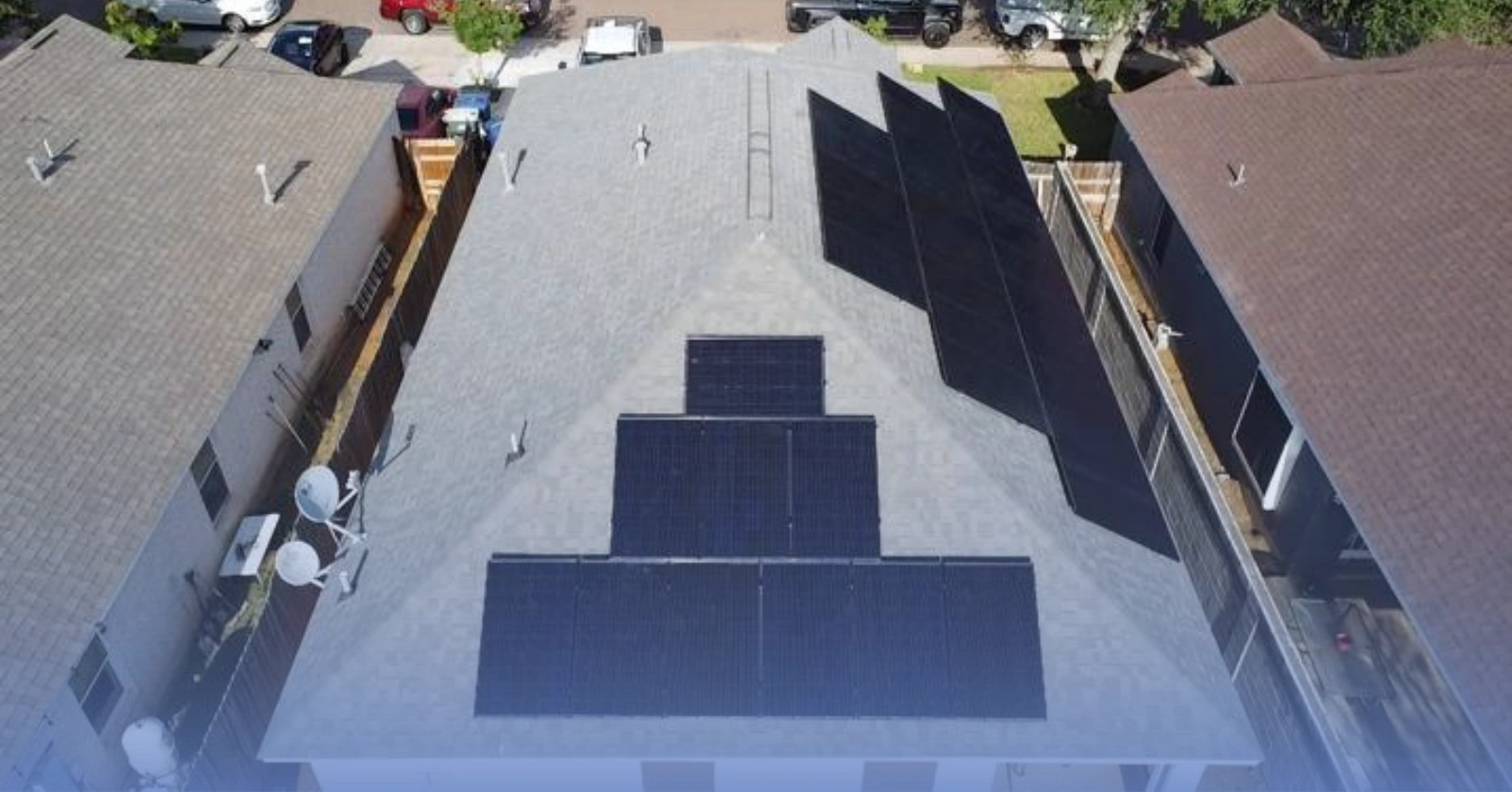Residential Solar Texas
Stop throwing money at sky-high electric bills every month. Lonestar Solar Services helps real families like yours slash energy costs while building wealth for generations ahead.

Curious about solar? Let's chat, no strings attached. We're just as passionate about the sun as you are.
Texas homeowners pay electricity bills averaging $174 monthly while facing increasing grid instability and rate hikes. Your family deserves energy independence and protection from rising costs. Solar panels generate clean electricity for 25+ years, providing decades of savings and backup power capability.
Lonestar Solar Services delivers complete residential solar solutions across Texas. Our certified installers provide turnkey solar systems that reduce electric bills by 40-90% while increasing home value and providing backup power during outages.
Get your free solar assessment today and discover how much your family can save with professional solar installation.

Texas Homeowners Face Rising Energy Costs and Grid Instability
Rising electricity rates strain Texas family budgets while grid failures during extreme weather leave homes without power. Texas electricity costs average 15.40¢ per kilowatt-hour with monthly bills reaching $155-175 for typical homes. Rising electricity rates in Texas continue increasing faster than household income.
Grid instability creates safety and comfort risks during severe weather events. Power outages affect millions of Texas families each year, leaving homes without air conditioning, refrigeration, or essential medical equipment. Traditional grid dependence exposes your family to circumstances beyond your control.
Solar energy provides the solution Texas homeowners need. Solar panels generate electricity directly on your roof, reducing utility dependence while providing backup power capability. Texas ranks second nationally in solar capacity because homeowners recognize solar's financial and practical benefits.
Solar Installation Costs in Texas: Complete Pricing Guide
Solar installation in Texas costs less than the national average, making Texas an attractive state for solar investment. The total cost of your solar system depends entirely on the size system your home requires based on your energy usage patterns.
How Much Should Solar Panel Installation Cost?
The cost of solar installation varies significantly based on system size, which is determined by your home's energy consumption. System costs include solar panels, inverters, mounting equipment, electrical components, permits, and professional installation.
Installation costs break down as follows:
- Solar panels and equipment: 60-70% of total cost
- Professional installation labor: varies by system size
- Permits and interconnection: varies by location
- System design and project management: included in total cost
Larger systems cost more upfront but provide better value per watt. Economics of scale reduce per-watt pricing for systems above certain sizes.

System Sizing Based on Home Size
How much does it cost to add solar panels to a 1000 square foot house? A 1,000 square foot home typically requires a system sized based on its energy consumption rather than square footage alone.
How much is a solar system for a 2000 sq ft house? A 2,000 square foot home's system size depends on energy usage patterns, efficiency, and electrical needs.
What size solar system do I need for a 2000 sq ft house? Most 2,000 square foot Texas homes require systems sized to offset their complete electricity usage. System size depends on these factors:
- Annual electricity consumption (typically 12,000-15,000 kWh)
- Roof orientation and available space
- Energy efficiency of appliances and HVAC
- Future electricity needs including electric vehicles
How many solar panels to run a 2000 sq ft house? The number of panels needed varies based on panel efficiency and your home's energy consumption, with most residential systems using high-efficiency panels to maximize production.
Understanding Solar System Economics
How much do solar panels and batteries cost for a 2000 square foot house? Solar systems with battery backup cost $35,000-45,000 before incentives. The 30% federal tax credit reduces this to $24,500-31,500 for complete energy independence.
Battery storage adds $15,000-20,000 to system costs but provides backup power during grid outages. Batteries qualify for the 30% federal tax credit when installed with solar panels.
Texas Solar Incentives Save Thousands in 2025
The federal solar tax credit provides 30% savings on complete system costs through December 31, 2025. Texas homeowners save an average of $6,390 with this incentive alone.
Federal Tax Credit Deadline Approaching
The 30% federal tax credit expires December 31, 2025 and will not be extended. Systems must be installed and operational by this deadline to qualify for the full 30% credit. Solar projects typically require 2-4 months from contract signing to completion.
Tax credit benefits include:
- 30% of total system cost including equipment, installation, permits
- No maximum credit limit for residential installations
- Credit can be carried forward to future tax years
- Applies to battery storage when installed with solar
Texas Property Tax Benefits
Texas provides 100% property tax exemption for residential solar installations. Do solar panels increase home value? Solar systems increase home values by approximately 4% while the tax exemption prevents higher property tax bills.
Property tax exemption benefits:
- Solar system value exempt from property assessments
- Home value increases without tax penalty
- Exemption continues for system lifetime
- Benefit transfers to new homeowners
Local Utility Rebates
Austin Energy provides $2,500 rebates plus Value of Solar credits at 9.91¢ per kilowatt-hour produced. AEP Texas offers rebates up to $2,500 for qualifying residential systems. New Braunfels Utilities provides rebates up to $3,000 based on system size and installation angle.
Available rebate programs:
- Austin Energy: $2,500 rebate plus production credits
- AEP Texas: $0.50 per watt for systems under 3kW, up to $3,000 for larger systems
- Oncor Electric: Incentives for solar-plus-battery installations
- El Paso Electric: Net metering at retail rates with $30.25 minimum bill

Our Professional Solar Installation Process
Lonestar Solar Services provides complete turnkey installations from initial assessment through system commissioning and ongoing monitoring. Our certified installation teams complete residential projects in 1-3 days depending on system size and complexity.
Comprehensive Home Assessment
Our solar consultants perform detailed energy assessments including historical usage analysis, roof structural evaluation, and shading studies using advanced solar modeling software. We design custom systems optimized for your property and provide accurate production estimates and savings projections.
Assessment includes:
- 12-month electricity usage analysis
- Roof condition and structural capacity evaluation
- Shading analysis using satellite imagery and on-site measurements
- Electrical panel and infrastructure review
- Custom system design with production modeling
Permits and Interconnection Management
We handle all permits and utility interconnection requirements including building permits, electrical permits, and utility agreements. Texas follows 2020 National Electrical Code Article 690 for solar installations with additional local requirements varying by jurisdiction.
Required approvals include:
- Local building permits for structural and fire safety
- Electrical permits verifying NEC compliance
- Utility interconnection agreements for grid connection
- Final inspections and system commissioning
Professional Installation Standards
Our skilled installation crews follow strict safety and quality protocols using only Tier 1 equipment with comprehensive warranties. Installations include system monitoring to track performance and identify any maintenance needs.
Installation process:
- Day 1: Equipment delivery, roof preparation, mounting system installation
- Day 2: Solar panel installation, DC wiring, inverter connections
- Day 3: AC electrical connections, system commissioning, final testing

Solar System Performance in Texas Climate
Texas receives 4.5-6.77 peak sun hours daily depending on location and season, making the state excellent for solar energy production. Peak sun hours represent the amount of solar irradiation equivalent to 1,000 watts per square meter used to rate solar panel output.
Regional Solar Performance Data
Dallas averages 5.2 peak sun hours annually while Austin receives 5.4 peak sun hours. Houston gets 4.9 peak sun hours and San Antonio averages 5.3 peak sun hours throughout the year.
Summer months provide 6+ peak sun hours while winter months deliver 3-4 peak sun hours. Annual solar production ranges from 1,300-1,600 kilowatt-hours per installed kilowatt across Texas locations.
System Performance Expectations
Can solar panels work on cloudy days? Solar panels continue producing electricity during cloudy weather at reduced output levels. Texas benefits from over 230 sunny days annually ensuring consistent solar generation year-round.
Can solar power run an air conditioner? Can I run AC with a solar panel? Properly sized solar systems easily power air conditioning loads, especially during summer months when solar production peaks. Solar generation aligns naturally with air conditioning demand during hot Texas summers.
Long-Term Performance and Payback
How long does it take for solar panels to pay for themselves? How long does it take solar panels to pay for themselves? Most Texas solar systems achieve payback in 6-10 years through electricity savings. Systems continue producing free electricity for 15+ years after payback resulting in substantial lifetime savings.
Are solar panels actually worth the money? Solar systems provide excellent returns in Texas due to abundant sunshine, rising electricity rates, and strong incentives. Most homeowners save $20,000-40,000 over 25 years compared to continued utility dependence.

Understanding Solar System Requirements and Rules
The 20% and 120% Rules Explained
What is the 20% rule for solar panels? The 20% rule typically refers to battery depth of discharge limitations to preserve battery life, though this varies by battery technology.
What is the 120% rule for solar? The 120% rule limits solar system backfeed through electrical panels to 120% of the panel's main breaker rating. This National Electrical Code requirement ensures safe integration with your home's electrical system.
Example: A 200-amp electrical panel with 200-amp main breaker can accept solar backfeed up to 40 amps (200 × 120% - 200 = 40 amps maximum solar breaker size).
Solar System Capabilities and Limitations
Can you run a house just on solar panels? Can a house run 100% on solar? Grid-tied solar systems can offset 100% of annual electricity usage while remaining connected to the utility grid for nighttime and backup power.
Solar-plus-battery systems provide complete energy independence during grid outages while maintaining grid connection for optimal economics. True off-grid systems require larger battery banks and backup generators for extended cloudy periods.
Addressing Common Solar Concerns
High Electric Bills with Solar
Why is my electric bill so high when I have solar panels? Why is my light bill so high if I have solar panels? Several factors can cause higher-than-expected bills including system underperformance, increased electricity usage, seasonal variations, or changes in utility rate structures.
Common causes include:
- System shading or equipment malfunction reducing production
- Increased electricity usage from new appliances or lifestyle changes
- Utility rate changes or seasonal rate variations
- System sizing insufficient for actual usage patterns
Professional system monitoring identifies performance issues while regular maintenance ensures optimal production. Our systems include comprehensive monitoring to alert homeowners of any performance problems.
Solar System Drawbacks and Limitations
Is there a downside to solar panels? Solar systems require significant upfront investment and depend on weather conditions for optimal performance. Financial benefits typically outweigh drawbacks especially with current incentive programs and financing options.
Potential limitations include:
- Weather-dependent electricity production
- Upfront investment requirement
- Roof space limitations for some homes
- Aesthetic considerations for historic properties
Why are people getting rid of their solar panels? Solar panel removal is uncommon but occurs due to roof replacement needs, home renovations, or system end-of-life considerations. Most properly installed systems provide 25+ years of reliable service.

Protecting Against Industry Challenges
Solar industry challenges affect some homeowners when installation companies go out of business or fail to provide promised service. What to do when your solar installer disappears requires careful planning and contractor selection.
Lonestar Solar Services provides stability and reliability through established local presence, comprehensive warranties, and ongoing service capabilities. We help homeowners affected by Texas solar companies going bankrupt and provide solar panel repair services when needed.
Avoiding Texas solar scams requires working with licensed, established contractors who provide detailed proposals, verifiable references, and transparent pricing.
Financing Options for Every Budget
Solar financing makes solar accessible for homeowners who cannot purchase systems with cash. Solar loans, leases, and power purchase agreements each provide different benefits depending on your financial situation.
Solar Loan Benefits
Solar loans preserve ownership and tax credit benefits while spreading costs over 10-25 years. Many homeowners find loan payments equal or less than previous electric bills creating immediate positive cash flow.
Loan advantages:
- Own your system and receive all incentives
- Typically 2-7% APR for qualified borrowers
- Immediate electric bill savings often exceed loan payments
- System continues generating free electricity after loan payoff
Alternative Financing Options
Solar leases require no upfront investment but forfeit ownership benefits including tax credits. Power Purchase Agreements (PPAs) provide electricity at rates typically below utility costs while the solar company owns and maintains the system.
PACE financing attaches payments to property taxes where available, providing another financing alternative for qualifying homeowners.
Service Coverage Across Texas
Lonestar Solar Services provides residential solar installation throughout major Texas metropolitan areas including Dallas, Houston, Austin, San Antonio, and Arlington.
We also serve homeowners in Laredo and El Paso ensuring professional solar installation across Texas. Each market has unique considerations including local building codes, utility interconnection requirements, and solar incentive programs.
Our local expertise ensures compliance with regional requirements while maximizing available incentives for every customer.
Answers to Your Solar Questions
Is it really worth it to install solar panels? Solar provides excellent value in Texas due to abundant sunshine, rising electricity rates, and strong financial incentives. Most systems achieve payback in 6-10 years and continue producing free electricity for 15+ additional years.
Solar system benefits include:
- 40-90% reduction in electric bills
- Protection from future rate increases
- Increased home value without higher property taxes
- Backup power capability with battery storage
- 25+ year system lifespan with minimal maintenance
How much to pay for solar panel installation? The investment in professional installation depends on your system size requirements. Quality installations justify proper investment as you depend on your installer for decades of service and warranty support.
Solar investment provides decades of benefits making proper installation and reliable installer selection crucial for long-term satisfaction and performance.
Ready to start saving with solar? Contact Lonestar Solar Services today for your free home solar assessment and discover how much your family can save with professional residential solar installation.
Call now or request your free quote online and join thousands of Texas families enjoying energy independence and lower electric bills with solar power.
More Than Just Panels
At Lonestar Solar Services, we turn Texas sunshine into real, reliable power for your home -no tricks, just smart technology. You get plenty of energy and a carbon footprint that barely leaves a mark.
- Top-Tier Panels: We use elite, Tier-1 solar panels made to last, all backed by a 30-year warranty.
- Powerful Microinverters: Our Enphase IQ8+ units are ultra-efficient and come with a 25-year warranty.
- Rock-Solid Backup: Every installation includes a 25-year workmanship warranty and a 10-year roof penetration guarantee.
- All-Inclusive Service: We handle everything -design, permits, installation, and ongoing support- so there are no loose ends.
Experience You Can Trust
Not every solar company is built the same. We don’t use random subcontractors -our Texas-based team handles every step, start to finish. With years of engineering and building under our belts, your solar project is done right the first time.
Buying direct from us means your installation is solid and your costs stay down. We own the process -support, repairs, and maintenance- so you get maximum power and zero excuses. Our EPC approach means one team, one promise, and no middlemen.
You’re in Control
Questions? Need support? We’re always here to help. With Lonestar Solar Services, you’re in charge of your energy future -lighting up your home, your way.
More services
All servicesSolar panels: because the sun doesn't send you a bill. Get a quote today and let's start saving.
ATTENTION TEXANS: The ITC tax credit will no longer be available after December 31st, take advantage of this incentive while it lasts and save 30% on your solar project



